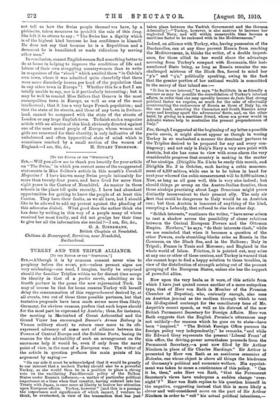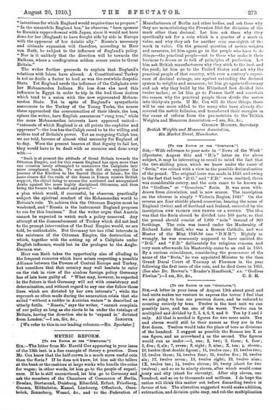TURKEY AND THE TRIPLE ALLIANCE.
[To THE EDITOR OP THE " SPECTATOR."1
SIR,—Although it is by common consent never wise to prophesy before the event, yet—unless present signs are very misleading—one need, I imagine, hardly be surprised
should the familiar Triplice within no far distant time merge its identity in that of a partie carree, admitting as its fourth partner in the game the now rejuvenated Turk. It may of course be that for home reasons Turkey will herself delay the consummation of this rapprochement desired by, at all events, two out of these three possible partners, but that tentative proposals have been made seems more than likely.
Germany, for obvious reasons, prefers that such hopes should for the most part be expressed by Austria; thus, for instance, the meeting in Marienbad of Count Aehrenthal and the Grand Vizier has encouraged Danzer's Armee Zeitung (a Vienna military sheet) to return once more to its oft- expressed advocacy of sone sort of alliance between the Powers of Central Europe and the Sublime Porte, basing its
reasons for the advisability of such an arrangement on the enormous help it would be, even if only from the naval point of view, in the case of a European war. The writer of the article in question prefaces the main points of his argument by saying:— "On our side it must be acknowledged that it would be greatly to our interest that a modern Turkey should also be a powerful Turkey, as she would then be in a position to place a strong veto on the vacillating Pan-Slavonic policy of the Balkan States under Russia's inftuence,—a matter of particular political importance at a time when that country, having entered into her Treaty with Japan, is once more at liberty to bestow her attention upon European affairs. Turkey, however" [and this is a passage the importance and significance of which cannot, I venture to think, be overlooked, in view of the transaction that has just' taken place between the Turkish Government and the German Admiralty]—" Turkey, however, is also anxious to increase her neglected Navy, and will within measurable time become a maritime factor to be reckoned with in the Mediterranean."
Indeed, an alliance with Turkey, who, having possession of the Dardanelles, can at any time prevent Russia from reaching the Mediterranean, is, thinks the writer, of a double import- ance, for those allied to her would share the advantage accruing from Turkey's compact wibh Roumania, this last- mentioned State being, as long as Russia remains the un- challenged mistress of the Black Sea, forced to mind her " p's " and " q's," politically speaking, owing to the fact that the greater portion of her national wealth is committed to the mercy of that inland sea :— "It lies in our interest," he says, "to facilitate in as friendly a manner as may be possible the consolidation of Turkey's internal affairs, in order that she may speedily become de facto that strong political factor we require, as much for the sake of effectually counteracting the endeavours of Russia as those of Italy by, on the one hand, arresting the Caucasian and South Russian army corps and keeping apart the adversaries' fleets, and, on the other hand, by giving us a maritime friend, whose sea power would in Adriatic waters help to neutralise the present preponderance of Italy."
For, though I suggested at the beginning of my letter a possible pantie carree, it might almost appear as though in wooing Turkey in so unabashed a manner the dominant partners to the Triplice desired to be prepared for any and every con- tingency; and not only is Italy's Navy a very sore point with Austria, but she has come to view with some alarm the very considerable progress that country is making in the matter of her airships. (Dirigible No. 2 is to be ready this month, and Dirigible No. 3 in October, each having a cubic measure- ment of 4,200 metres, while one is to be taken in hand for next year whereof the cubic measurement will be 8,000 metres.) Now, as long as all goes well, this is very nice indeed ; but should things go wrong on the Austro-Italian frontier, then those airships practising about Lago Bracciano might prove distinctly inconvenient to their present ally. The only air Beet that could be dangerous to Italy would be an Austrian one ; but then Austria is innocent of anything of the kind, excepting a Lebaudy, that refused to rise the other day.
" Selfish interests," continues the writer, " have never arisen to cast a shadow across the possibility of closer relations between the Central European Powers and the Ottoman Empire. Nowhere," he says, "do their interests clash," while we are reminded that when it becomes a question of the other Powers, such. stumbling-blocks arise as Russia in the Caucasus, on the Black Sea, and in the Balkans ; Italy in Tripoli; France in Tunis and Morocco ; and England in the whole world of Islam. Friction, it is pointed out, may arise at any one or other of these centres, and Turkey is warned that she cannot hope to find a happy solution to these troubles, in view of the distribution of strength arising out of the present grouping of the European States, unless she has the support of powerful allies.
Now upon the very heels as it were, of this article from which I have just quoted comes another of a more outspoken type, that of Herr von Rath (a Member of the Prussian Chamber of Deputies), who, curiously enough, also uses an Austrian journal as the medium through which to vent his ill-disguised contempt for tke conciliatory tone of Mr. Asquith's recent speech, as well as his distrust of the new British Permanent Secretary for Foreign Affairs. Herr von Rath suggests that the English Premier's utterances may not unlikely—for reasons which he goes on to state—have been " inspired." " The British Foreign Office pursues its foreign policy very independently," he remarks, "and while Sir Edward Grey represents the present 'Liberal Front' of this office, the driving-power nevertheless proceeds from the Permanent Secretary,—a post now filled by Sir Arthur Nicolson in place of Sir Charles Hardinge." Sir Arthur is presented by Herr von Rath as an assiduous cementer of Ententes, one whose object is above all things the hindrance of Germany's political and economic welfare. His appoint- ment was taken to mean a continuance of this policy. " Can it be, then," asks Herr von Rath, "that the Permanent Secretary's views have undergone a sudden change over- night '?" Herr von Rath replies to his question himself in the negative, suggesting instead that this is more likely a clever and well-considered move on the part of Sir Arthur Nicolson in order to " veil" his actual political intentions,— "intentions for which England would require time to prepare."
"In the meanwhile England has," he observes, "been sponsor to Russia's rapprochement with Japan, since it would not have done for her (England) to have fought side by side in Europe
with the opponent of her Asiatic ally." Russia's necessary and ultimate expansion will therefore, according to Herr on Rath, be subject to the influence of England's policy.
" Nor is it unlikely that the direction will be towards the Balkans, where a conflagration seldom comes amiss to Great Britain."
The writer further proceeds to explain that England's relations with Islam have altered. A Constitutional Turkey is not so docile a factor to lead as was the erstwhile despotic State. Yet England needs the influence of the Caliphate over her Mohammedan Indians. No less does she need this influence in Egypt in order to nip in the bud those desires which tend to a union with the now rejuvenated Moham- medan State. Yet in spite of England's sympathetic assurances to the Turkey of the Young Turks, the nearer these approached the consummation of their ideals, the less, opines the writer, have English assurances " rung true," while the more Mohammedan interests have appeared united— "interests of which England is at all points the exploiter and oppressor"—the less has the Caliph cared to be the willing and selfless tool of Britain's power. Yet an easygoing Caliph has, we are told, become of almost vital necessity for England of to-day. Were the present bearers of that dignity to fail her, they would have to be dealt with as enemies and done away with :—
" Such is at present the attitude of Great Britain towards the Ottoman Empire, and for this reason England has upon more than one occasion lately attempted to manoeuvre the Caliphate into more complacent hands. To such ends did she engineer the journey of the Khedive to the Sacred Shrine of Islam ; for the same reason did the raids of the Imam in Yemen receive British support, the object being to arouse the scattered and unorganised Arabs against the more highly disciplined Ottomans, and thus bring the former to influence and power,"—
a plan which would, if successful, he observes, practically subject the spiritual conduct of the Mohammedan world to Britain's rule. To achieve this the Ottoman Empire must be weakened, and "Russia is the instrument England proposes to use for this business." But the writer urges that Austria cannot be expected to watch such a policy unmoved. Any attempt at the dismemberment of Turkey which did not lead to the prompt intervention of the Dual Empire would, we are told, be unthinkable. But Germany too has vital interests in the existence of the Ottoman Empire, the destruction of which, together with the setting up of a Caliphate under English influence, would but be the prologue to the Anglo- German war.
Herr von Rath takes the opportunity also of alluding to the frequent rumours which have arisen respecting a possible Alliance between the Powers of Central Europe and Turkey, but considers that that country may well hesitate to enter on the risk in view of the aimless foreign policy Germany has of late been guilty of. " What may, however, be expected in the future is that Germany will act with consistency and determination, and without regard to any one else follow those lines which are dictated by her own interests "; while the reproach so often made during the annexation crisis that she sailed "without a rudder in Austrian waters " is described as utterly futile. "Russia," says the writer, " cannot complain of our policy as long as she elects to be under the tutelage of Britain, having the direction she is to 'expand in' dictated from London."—I am, Sir, &c., IGNOTUS.
• [We refer to this in our leading columns.—En. Spectator.]







































 Previous page
Previous page